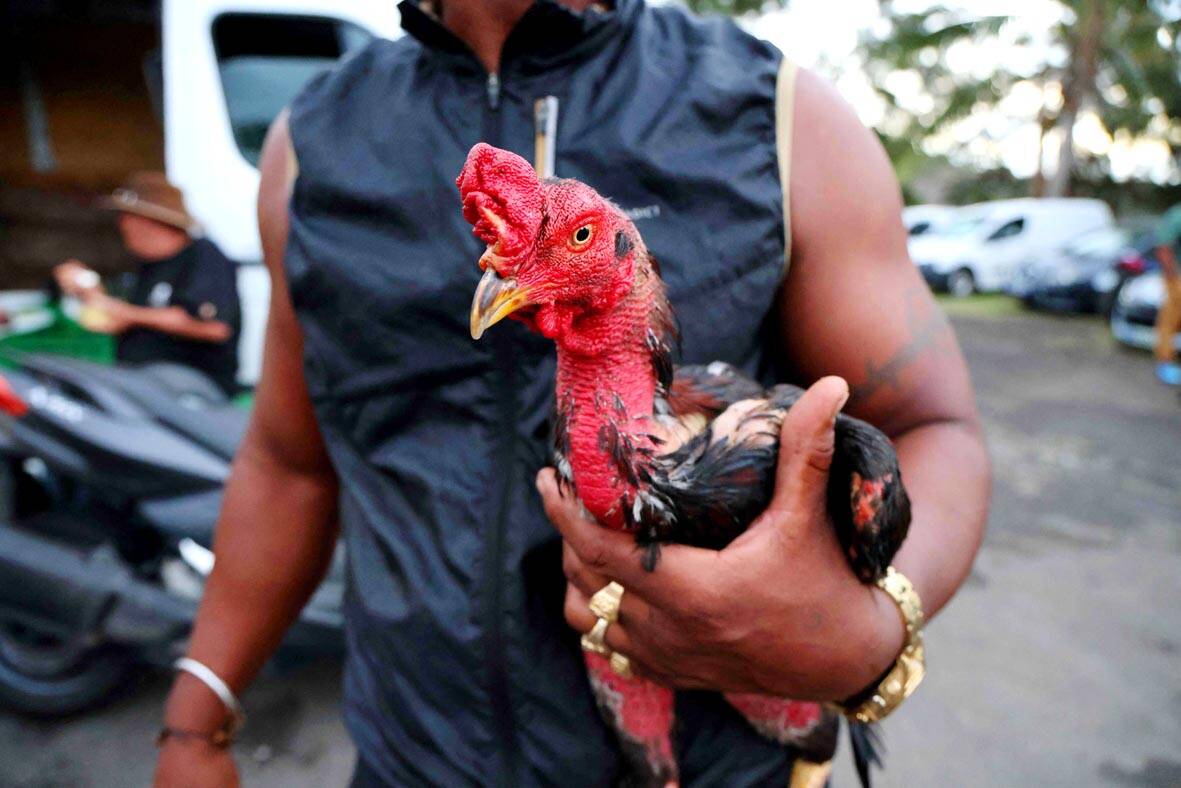The swing of a talon and a flurry of feathers leaves a rooster motionless, a cockfight bout viewed as cruel by many but which binds disparate Indian forest communities together.
India is renowned for its fanatical cricket obsession but in the central state of Chhattisgarh, cockfighting draws the crowds.
“Earlier there was no other entertainment and it helped us meet people from other villages,” said Raju, whose skill in raising fighting fowl has made him something of a local celebrity.

Photo: AFP
“Even with all the changes around us today, the sport is still very popular,” the 32-year-old added.
The forests of Bastar district are home to numerous tribal communities living in scattered villages.
India has pumped millions of dollars into infrastructure development, and new roads and mobile phone towers have brought the forest’s inhabitants somewhat closer to the outside world.
Rugged terrain and the tyranny of distance in remote Bastar district still lend few occasions for these villages to interact with each other.
But when a cockfight is on the calendar, hundreds of men will walk far across rivers, through dense bushland and over hills to get a ringside view.
“I do nothing but organize fights, raise roosters and place bets,” said Bhagat, 35, of Katekalyan village.
FAME AND RESPECT
Last month was Katekalyan’s turn to host a bout, with men from out of town ringing the fence of the dirt enclosure where roosters spar.
Most cockfights are over in the blink of an eye, with the pre-game pageantry accounting for most of the action. Bhagat and a rival rooster owner first hold their bird’s beak to beak to gauge whether they have the necessary hostility to battle.
Both men then use twine to fix sharp blades to the claws of their charges as the crowd shouts out their small wagers on the outcome.
Along with much of the rest of the world, cockfighting is banned in numerous Indian states on animal cruelty grounds.
People for the Ethical Treatment of Animals (PETA) India call cockfighting “barbaric,” and campaigns to shut it down for good.
But the men living in Bastar’s forests see it as an integral part of their community fabric.
Roosters that survive multiple bouts are lauded alongside their owners.
Raju said the most enduring fighters were locally remembered with the same reverence that the rest of India holds for cricketing greats like former captain Sachin Tendulkar.
“Like you have a field for cricket, this is our field,” he said. “And the winners get fame and respect, just like Sachin did by scoring all his runs.”
Bhagat said it always grieved him when one of his animals died in combat.
“When we lose a rooster in the fight, our hearts are in pain for a few days,” he said. “But then we get drunk, and then there will be peace.”

On April 26, The Lancet published a letter from two doctors at Taichung-based China Medical University Hospital (CMUH) warning that “Taiwan’s Health Care System is on the Brink of Collapse.” The authors said that “Years of policy inaction and mismanagement of resources have led to the National Health Insurance system operating under unsustainable conditions.” The pushback was immediate. Errors in the paper were quickly identified and publicized, to discredit the authors (the hospital apologized). CNA reported that CMUH said the letter described Taiwan in 2021 as having 62 nurses per 10,000 people, when the correct number was 78 nurses per 10,000

As we live longer, our risk of cognitive impairment is increasing. How can we delay the onset of symptoms? Do we have to give up every indulgence or can small changes make a difference? We asked neurologists for tips on how to keep our brains healthy for life. TAKE CARE OF YOUR HEALTH “All of the sensible things that apply to bodily health apply to brain health,” says Suzanne O’Sullivan, a consultant in neurology at the National Hospital for Neurology and Neurosurgery in London, and the author of The Age of Diagnosis. “When you’re 20, you can get away with absolute

May 5 to May 11 What started out as friction between Taiwanese students at Taichung First High School and a Japanese head cook escalated dramatically over the first two weeks of May 1927. It began on April 30 when the cook’s wife knew that lotus starch used in that night’s dinner had rat feces in it, but failed to inform staff until the meal was already prepared. The students believed that her silence was intentional, and filed a complaint. The school’s Japanese administrators sided with the cook’s family, dismissing the students as troublemakers and clamping down on their freedoms — with

As Donald Trump’s executive order in March led to the shuttering of Voice of America (VOA) — the global broadcaster whose roots date back to the fight against Nazi propaganda — he quickly attracted support from figures not used to aligning themselves with any US administration. Trump had ordered the US Agency for Global Media, the federal agency that funds VOA and other groups promoting independent journalism overseas, to be “eliminated to the maximum extent consistent with applicable law.” The decision suddenly halted programming in 49 languages to more than 425 million people. In Moscow, Margarita Simonyan, the hardline editor-in-chief of the